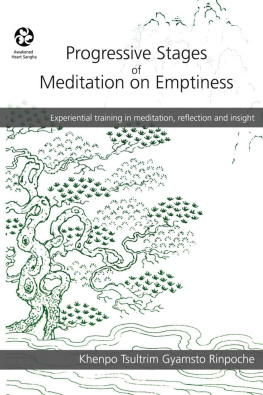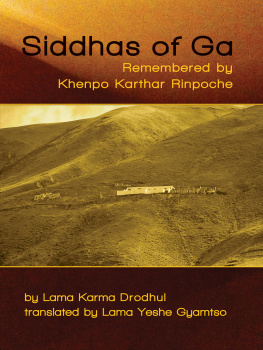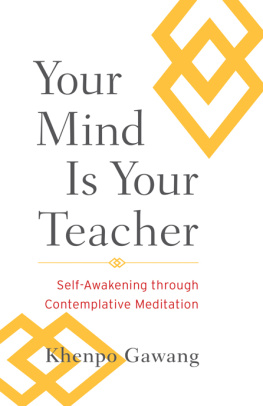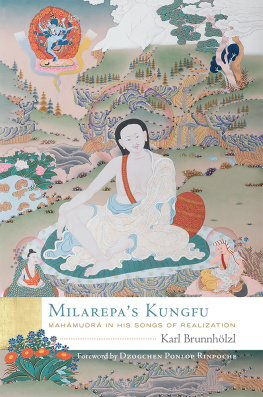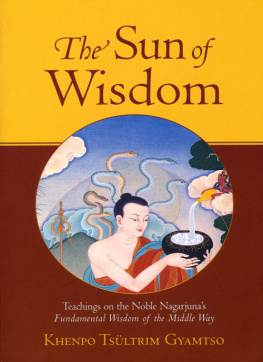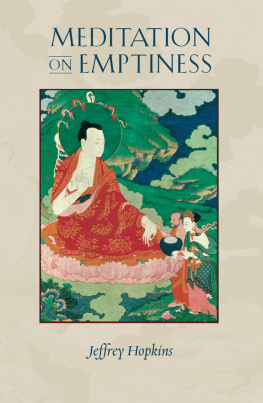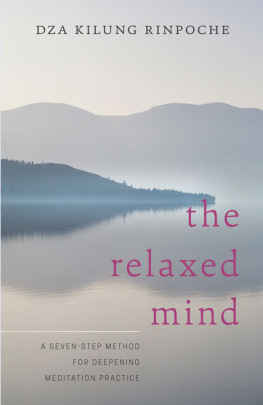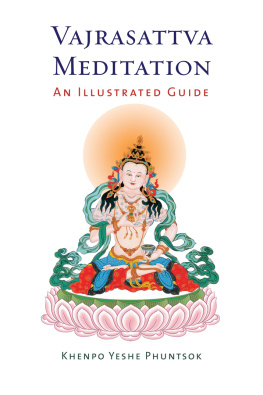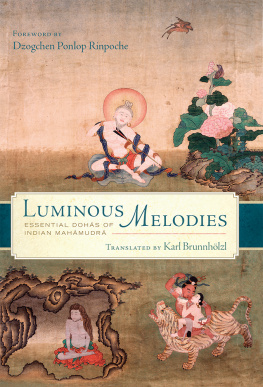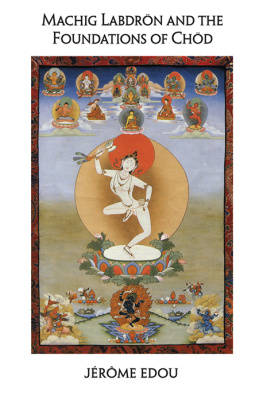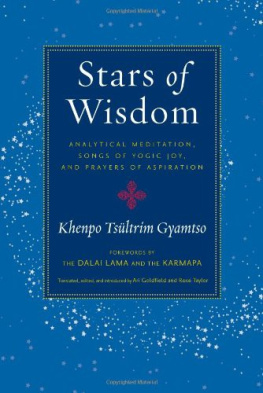Khenpo Tsultrim Gyamtso Rinpoche - Progressive Stages of Meditation on Emptiness
Here you can read online Khenpo Tsultrim Gyamtso Rinpoche - Progressive Stages of Meditation on Emptiness full text of the book (entire story) in english for free. Download pdf and epub, get meaning, cover and reviews about this ebook. year: 2016, publisher: UNKNOWN, genre: Religion. Description of the work, (preface) as well as reviews are available. Best literature library LitArk.com created for fans of good reading and offers a wide selection of genres:
Romance novel
Science fiction
Adventure
Detective
Science
History
Home and family
Prose
Art
Politics
Computer
Non-fiction
Religion
Business
Children
Humor
Choose a favorite category and find really read worthwhile books. Enjoy immersion in the world of imagination, feel the emotions of the characters or learn something new for yourself, make an fascinating discovery.
- Book:Progressive Stages of Meditation on Emptiness
- Author:
- Publisher:UNKNOWN
- Genre:
- Year:2016
- Rating:3 / 5
- Favourites:Add to favourites
- Your mark:
- 60
- 1
- 2
- 3
- 4
- 5
Progressive Stages of Meditation on Emptiness: summary, description and annotation
We offer to read an annotation, description, summary or preface (depends on what the author of the book "Progressive Stages of Meditation on Emptiness" wrote himself). If you haven't found the necessary information about the book — write in the comments, we will try to find it.
Progressive Stages of Meditation on Emptiness — read online for free the complete book (whole text) full work
Below is the text of the book, divided by pages. System saving the place of the last page read, allows you to conveniently read the book "Progressive Stages of Meditation on Emptiness" online for free, without having to search again every time where you left off. Put a bookmark, and you can go to the page where you finished reading at any time.
Font size:
Interval:
Bookmark:
by
Khenpo Tsultrim Gyamtso Rinpoche
Translated and arranged by Lama Shenpen Hookham 1st edition: 1986 Longchen Foundation
2nd edition: 2001 Zhyisil Chokyi Ghatsal 3rd edition: 2016 Shrimala TrustISBN-13: 978-1537409009 ISBN-10: 153740900XCopyright The Marpa Foundation for the Study, Practice and Support of the Buddha Dharma And Shenpen HookhamTranslation, adaption and reproduction forbidden without the authorization of Shenpen Hookham and Marpa Foundation.
This edition published by the Shrimala Trust 2016Illustrations and cover by Carlo Luyckx. Reproduction forbidden without his permission.
Khenpo Rinpoche is one of the foremost living teachers of the Kagyu tradition of Tibetan Buddhism, a great scholar and master of meditation who traveled the world teaching in Buddhist centres everywhere.
In his late teens and early twenties he trained as a yogin in Tibet with a local yogin known as Zopa Tharchin. He spent his early youth in retreat in the mountains until his teacher told him to study for the benefit of others. A renowned scholar, he has always excelled in philosophical debate and turned the minds of his opponents and students towards their own inner experience rather than getting lost in intellectual fabrications.
After the communist invasion of Tibet, Khenpo Rinpoche fled to India in 1960. He spent many years in Bhutan as a wandering yogin, meditating in caves and hermitages. In 1975 he was asked by the sixteenth Karmapa, head of the Kagyu tradition, to be abbot of the main Kagyu centre in France. However he asked instead to be allowed to travel and help people everywhere.
He has done that ever since, leading a truly simple, homeless life; he is a master of non-attachment. He has many times refused to accept property to build Buddhist centres and he has regularly given away all of his money. Khenpo Rinpoche has always demonstrated the carefree life of a yogin, singing spontaneous songs of realisation wherever he went, devoted only to the welfare of others.
The Venerable Khenpo Tsultrim Gyamtso Rinpoche came to Europe at the request of H.H. 16th Karmapa in 1977. He is one of the most erudite scholars and accomplished yogins of the Karma Kagyu lineage of our day. He is especially well known for his breadth of vision and the clarity of his Dharma expositions.
While he unites prodigious scholarship with great compassion, he also embodies the training and temperament of a true yogin. In fact he is often compared to the great yogin Milarepa. Like him he is known for his spontaneous songs of realization.
For decades he travelled around the world teaching wherever he was invited leaving an indelible impression on many sanghas. At the same time in conjunction with Thrangu Rinpoche he was training the next generation of Kagyu tulkus and khenpos at the Nalanda Institute for Higher Studies in Rumtek, Sikkim. He also founded and continues to support nunneries in Tibet, Bhutan and Nepal. These are just a few of the things he has accomplished in his life. For more information go to his website - marpafoundation.org.
The Marpa Foundation, based in USA, supports his various projects including his nunneries and archives of his teachings. More recently his students have formed the Marpa Network in Europe and Asia to keep in touch with each other and work together to carry Rinpoches vision forward. Ponlop Rinpoche, who regards Khenpo Rinpoche as his root Lama, draws on his teachings in his Nithartha Insitute programmes (nalandabodhi.org for details).
At present Khenpo Rinpoche is in his eighties living at Tekchokling nunnery that he founded in Boudhanath, Nepal.
He first taught the progressive stages on Emptiness in Europe in 1978 and over the years he taught it again on a number of occasions in different countries, including America in 1985.
Much of his presentation derived from Jamgon Kongtruls Encyclopaedia of Knowledge (shes bya kun khyab). Kongtrul was a great Kagyu teacher of the late 19th century, famous for his non-sectarian approach.
In 1979 he asked me to write a small booklet by transcribing his teachings given that year to the Kagyupa Institute of Mahayana Buddhist Studies (Kagyu Tekchen Shedra) in Brussels. Due to circumstances, which forced me to produce the booklet very hurriedly, it was inadequate in many ways. Nonetheless it was well received and immediately translated into French and Greek. Over the years that elapsed since the appearance of the first edition Khenpo Rinpoche further clarified a number of questions for me and has asked me to include the clarifications in subsequent editions. With Khenpo Rinpoches permission I have also included a number of points that arose in the discussions my husband Michael Hookham and I had with Khenpo Rinpoche in Brussels and Oxford in 1984 and 1985.
This present edition has been further edited to remove mistakes and to clarify a number of points. Lama Tashi Lhamo and Chryssoula Zerbini are involved in translating the text into Spanish at this time and they had various queries. Chryssoula helpfully drew my attention to points that needed clarifying and correcting. This text represents, therefore, a more refined and extensive version of the original transcribed course and earlier editions. The second edition in particular needed correcting because in some places key sentences were missing.
Since it was first published in 1986, the text has been translated into many languages right across the world and has been used in many Dharma centres and even academic institutions as a basis for courses by many teachers. This edition is currently being made into an audio-book.
Although there are recordings available from the Marpa Foundation of the original teachings Rinpoche gave on the subject of progressive stages of meditation on Emptiness, there is no recording that corresponds to this text exactly since it was put together from drawing on a number of very similar recordings and then incorporating other explanatory material into the text to help it flow more easily in English. Although there are significant changes in this edition, in the main these are small compared to the bulk of the material, which is the same in each edition.
My aim has always been to present all Rinpoches points clearly and accurately in a readable form. To the extent that I have failed I apologize. At least I can hope that my work will inspire others to produce something better! I should add that in some places I have included discussion of views commonly held by westerners. I found that a number of intelligent and perceptive proofreaders had difficulty in relating to the subject matter, because of certain assumptions they were making as westerners, concerning what Khenpo Tsultrim was saying. Since I find these questions often arise, I have tried to circumvent misunderstanding by actually formulating them in ways I have heard expressed and then showing how they relate to the subject matter in hand. In general, where the views of westerners are referred to, these sections represent my own additions.
Shenpen Hookham
August 2016
The Hermitage, Ynys Graianog, Criccieth LL52 0NT
Progressive stages of meditation on Emptiness (Tib. stong nyid sgom rim) is a series of meditation practices on a particular aspect of the Buddhas teachings. The idea is that by beginning with ones first rather coarse common sense understanding, one progresses through increasingly subtle and more refined stages until one arrives at complete and perfect understanding. Each stage in the process prepares the mind for the next in so far as each step is fully integrated into ones understanding through the meditation process.
Font size:
Interval:
Bookmark:
Similar books «Progressive Stages of Meditation on Emptiness»
Look at similar books to Progressive Stages of Meditation on Emptiness. We have selected literature similar in name and meaning in the hope of providing readers with more options to find new, interesting, not yet read works.
Discussion, reviews of the book Progressive Stages of Meditation on Emptiness and just readers' own opinions. Leave your comments, write what you think about the work, its meaning or the main characters. Specify what exactly you liked and what you didn't like, and why you think so.

